- Home
- Brian Jacques
Castaways of the Flying Dutchman fd-1
Castaways of the Flying Dutchman fd-1 Read online
Castaways of the Flying Dutchman
( Flying Dutchman - 1 )
Brian Jacques
A boy and dog trapped aboard the legendary ship, the Flying Dutchman, are sent off on an eternal journey by an avenging angel, roaming the earth throughout the centuries in search of those in need. Their travels lead them to Chapelvale, a sleepy nineteenth century village whose very existence is at stake. Only by discovering the buried secrets and solving the dust-laden riddles of the ancient village can it be saved. This will take the will and wile of all the people-and a very special boy and dog! Brian Jacques turns from Redwall to a very different sort of story, and succeeds admirably.
Amazon.com Review
Fans of the Redwall series eager to sink their teeth into the latest adventure from Brian Jacques will be surprised to find that the cover of Castaways of the Flying Dutchman belies the contents of this fine mystery novel. A handsome young lad, sporting a billowing, ripped shirt, gazes off into the distance, while behind him a ship founders on an eerily tempestuous sea. It's true, the first (brief) section of the book does tell the tale of a stowaway orphan on the legendary, ill-fated ship, the Flying Dutchman. And that's as swashbuckling a story as they come. But as soon as the boy and his newly adopted dog are tossed into the sea during a ferocious storm, the book takes a sharp turn. Ben and his dog, Ned, given eternal life by a sympathetic angel, now set out to "bring confidence and sympathy, help others to change their fate." Two centuries later, they arrive in the village of Chapelvale, which is filled with quirky, affectionate citizens, who immediately welcome the mysterious but kindhearted and brave boy and his dog. The impending destruction of their village by the blustering, bloated Obadiah Smithers, an industrial speculator, propels Ben and his new friends into a thrilling search for a solution, involving ancient Byzantine gold chalices, mysterious coded messages, and some fierce tête-à-têtes with hired bullies. Illustrator Ian Schoenherr's intriguing line drawings at the beginning of each chapter hint at the upcoming clues to the mystery. Redwall fans be warned: you'll find no warrior mice here. But readers will find a satisfying story that never leaves a doubt as to the ability of good to triumph over evil.
BRIAN JACQUES
Castaways
of the
FLYING DUTCHMAN
ALSO BY BRIAN JACQUES
Redwall
Mossflower
Mattimeo
Mariel of Redwall
Salamandastron
Martin the Warrior
The Bellmaker
Outcast of Redwall
Pearls of Lutra
The Long Patrol
Marlf ox
The Legend of Luke
Lord Brocktree
The Great Redwall Feast
The Redwall Map and Riddler
Redwall Friend and Foe
Build Your Own Redwall Abbey
Seven Strange and Ghostly Tales
Copyright © 2001 by The Redwall Abbey Company, Ltd.
Illustrations copyright © 2001 by Ian Schoenherr
All rights reserved.
THE LEGEND OF THE FLYING DUTCHman. Who knows how it all began: Throughout the centuries many a
seaman could swear an oath that he had seen the phantom ship. Plowing an endless course over storm-tossed seas and
the deeps of mighty oceans. Many a night, mariners have sat together in lantern-lit fo'c'sle heads, speaking in hushed
tones of the vessel, and its master, Captain Vanderdecken. What awful curse sent the Flying Dutchman bound on an
eternal voyage, across the trackless watery wastes, from the Marquesas to the Arctic Circles, from the Coral Seas to
the Yucatan Straits, forever roaming alone. Whenever the ghostly craft is sighted, death is near. Bad fortune hovers
about those poor sailors, who see by chance what they wish their eyes had never witnessed.
The Flying Dutchman!
Salt-stiff rigging and gale-torn sails flapping eerily, a barnacle-crusted prow, down by the bow in soughing
troughs of blue-green waves. Crewed by silent wraiths of humanity to whom time and the elements have no end.
Vanderdecken paces the quarterdeck, his face like ancient yellow parchment, hair laced by flying spume, wild,
hopeless eyes searching the horizons of the world. Bound to the sea for eternity. For what dread crime? Which
unspoken law of man, nature, or God, did he break? What dread nemesis doomed him, his crew, and their ship?
Who knows how it all began?
Only two living beings!
I take up my pen to tell you the tale.
THE SHIP
1.
COPENHAGEN. 1620.
THEY SAT FACING ONE ANOTHER ACROSS A table in the upper room of a drinking den known as the
Bar-bary Shark. Two men. One a Dutch sea captain, the other a Chinese gem dealer. Muffled sounds of foghorns from
the nighttime harbor, mingling with the raucous seaport din outside, passed unheeded. A flagon of fine gin and a
pitcher of water, close to hand, also stood ignored. In the dim, smoke-filtered atmosphere, both men's eyes were
riveted upon a small, blue velvet packet, which the gem dealer had placed upon the table.
Slowly he unwrapped the cloth, allowing a large emerald to catch facets of the golden lantern light. It
shimmered like the eye of some fabled dragon. Noting the reflected glint in the Dutchman's avaricious stare, the
Chinaman placed his long-nailed hand over the jewel and spoke softly. "My agent waits in Valparaiso for the arrival
of a certain man—somebody who can bring home to me a package. It contains the brothers and sisters of this green
stone, many of them! Some larger, others smaller, but any one of them worth a fortune.
Riches to lire a man beyond his wildest dreams. He who brings the green stones to me must be a strong man,
commanding and powerful, able to keep my treasure from the hands of others. My friend, I have eyes and ears
everywhere on the waterfront. I chose you because I know you to be such a man!"
The captain's eyes, bleak and grey as winter seas, held the merchant's gaze. "You have not told me what my
reward for this task will be."
The gem dealer averted his eyes from the captain's fearsome stare. He lifted his hand, exposing the emerald's
green fire. "This beautiful one, and two more like it upon delivery."
The Dutchman's hand closed over the stone as he uttered a single word. "Done!"
The boy ran, mouth wide open, gasping to draw in the fog-laden air. His broken shoes slapped wetly over the
harbor cobblestones. Behind him the heavy, well-shod feet of his pursuers pounded, drawing closer all the time. He
staggered, forcing himself to keep going, stumbling through pools of yellow tavern lights, on into the milky, muffling
darkness. Never would he go back, never again would the family of his stepfather treat him like an animal, a drudge, a
slave! Cold sweat streamed down into his eyes as he forced his leaden legs onward. Life? No sane being could call
that life: a mute, dumb from birth, with no real father to care for him. His mother, frail creature, did not live long after
her marriage to Bjornsen, the herring merchant. After her death the boy was forced to live in a cellar. Bjornsen and his
three hulking sons treated their captive no better than a dog. The boy ran with the resounding clatter of Bjornsen's
sons close behind him. His one aim was to escape them and their miserable existence. Never would he go back.
Never!
A scarfaced Burme
se seaman crept swiftly downstairs, where he joined four others at a darkened corner of the
Barbary Shark tavern. He nodded to his cohorts, whispering, "Kapitan come now!"
They were all sailors of varied nationalities, as villainous a bunch of wharf rats as ever to put foot on shipboard.
Drawing further back into the shadows, they watched the staircase, which led from the upper room. The long blue scar
on the face of the Burmese twitched as he winked at the others.
"I 'ear all, Kapitan goes for the green stones!"
A heavily bearded Englishman smiled thinly. "So, we ain't just takin' a cargo of ironware out to Valparaiso.
Who does Van-derdecken think he's foolin', eh? He's only goin' out there to pick up a king's ransom of precious
stones!"
A hawkfaced Arab drew a dagger from his belt. "Then we collect our wages, yes?"
The Englander, who was the ringleader, seized the Arab's wrist. "Aye, we'll live like lords for the rest of our
lives, mate. But you stow that blade, an' wait 'til I gives the word."
They took another drink before leaving the Barbary Shark.
The boy stood facing his pursuers—he was trapped, with no place to run, his back to the sea. Bjornsen's three
big sons closed in on the edge of the wharf, where their victim stood gasping for air and trembling in the fogbound
night. Reaching out, the tallest of the trio grabbed the lad's shirtfront.
With a muted animal-like grunt, the boy sank his teeth into his captor's hand. Bjornsen's son roared in pain,
releasing his quarry and instinctively lashing out with his good hand. He cuffed the boy a heavy blow to his jaw.
Stunned, the youngster reeled backward, missed his footing, and fell from the top of the wharf pylons, splashing into
the sea. He went straight down and under the surface.
Kneeling on the edge, the three brothers stared into the dim, greasy depths. A slim stream of bubbles broke the
surface. Then nothing. Fear registered on the brutish face of the one who had done the deed, but he recovered his
composure quickly, warning the other two.
"We could not find him, nobody will know. He had no relatives in the world. What's another dumb fool more or
less? Come on!"
Checking about to see that they had not been noticed in the dark and fog, the trio scurried off home.
Standing at the gangplank, the Dutch captain watched the last of his crew emerge from the misty swaths which
wreathed the harbor. He gestured them aboard.
"Drinking again, jahl Well, there be little enough to get drunk on 'tween here and the Pacific side of the
Americas. Come, get aboard now, make ready to sail!"
The blue scar contracted as the Burmese smiled. "Aye, aye, Kapitan, we make sail!"
With floodtide swirling about her hull and the stern fenders scraping against the wharf timbers, the vessel came
about facing seaward. Staring ahead into the fog, the captain brought the wheel about half a point and called, "Let go
aft!"
A Finnish sailor standing astern flicked the rope expertly, jerking the noosed end off the bollard which held it.
The rope splashed into the water. Shivering in the cold night air, he left it to trail along, not wanting to get his hands
wet and frozen by hauling the backstay rope aboard. He ran quickly into the galley and held his hands out over the
warm stove.
The boy was half in and half out of consciousness, numbed to his bones in the cold sea. He felt the rough manila
rope brush against his cheek and seized it. Painfully, hand over hand, he hauled himself upward. When his feet
touched ship's timber, the boy pulled his body clear of the icy sea and found a ledge. He huddled on it, looking up at
the name painted on the vessel's stern in faded, gold-embellished red. Fleiger Hollander. He had never learned to read,
so the letters meant nothing to him. Fleiger Hollander in Dutch, or had the lad been able to understand English, Flying
Dutchman.
2
MORNING LIGHT FOUND THE FOG HAD lifted, revealing a clear blue icy day. The Flying Dutchman
plowed past Goteborg under full sail, ready to round the Skagen point and sail down the Skagerrak out into the wide
North Sea. Philip Vanderdecken, captain of the vessel, braced himself on the small fo'c'sle deck, feeling the buck and
swell of his ship. Light spray from the bow wave touched his face, ropes and canvas thrummed to the breeze
overhead.
Valparaiso bound, where his share of the green stones would make him a rich man for life, he was never a man
to smile, but he allowed himself a single bleak nod of satisfaction. Let the shipowners find another fool to sail this
slop-bucket around the high seas. Leave this crew of wharf scum to pit their wits against another captain. He strode
from one end of the vessel to the other, snapping curt commands at the surly bunch that manned the craft. Often he
would wheel suddenly about—Vanderdecken neither liked nor trusted his crew. Judging by the glances he received
and the muttered conversations that ceased at his approach, he knew they were speculating about the trip, plotting
against him in some way probably.
His solution to this was simple: keep the hands busy night and day, show them who was master.
Vanderdecken's quick eye missed nothing; he glanced past the steersman to the ice-crusted rope left trailing astern.
Signaling the Finnish deckhand with a nod, he pointed. "Stow that line and coil it, or the seawater will ruin it!"
The deckhand was about to make some remark; when he noted the challenging look in the captain's eye, he
touched his cap. "Aye aye, Kapitan!"
Vanderdecken was making his way amidships when the Finn leaned over the stern rail, shouting. "Come look
here— a boy, I think he's dead!"
All hands hurried to the stern, crowding the rail to see. Pushing his way roughly through, the captain stared
down at the crumpled figure on the molding below his cabin gallery. Crouched there was a boy, stiff with seawater
and frost.
Vanderdecken turned to the men, his voice harsh and flat. "Leave him there or push him into the sea, I don't
care."
The ship's cook was a fat, bearded Greek, who had left his galley to see what all the excitement was about. He
spoke up.
"I don't have galley boy. If he's alive, I take him!"
The captain gave the cook a scornful glance. "He'd be better off dead than working for you, Petros. Ah, do what
you want. The rest of you get back to work!"
Lumbering down to the stern cabin, Petros opened the window and dragged the lad in. To all apparent purposes,
the boy looked dead, though when the Greek cook placed a knife blade near his lips, a faint mist clouded it. "By my
beard, he breathes!"
He carried the boy to the galley and laid him on some sacking in a corner near the stove. The ship's mate, an
Englishman, came into the galley for a drink of water. Placing the toe of his boot against the boy's body, he nudged
him. The lad did not respond.
The Englander shrugged. "Looks dead to me, I'd sling him over the side if I was you."
Petros pointed with his keen skinning knife at the Englander. "Well, you not me, see. I say he stays. If he comes
around, I need help in this galley, lots of help. He's mine!"
Backing off from the knife, the Englander shook his head. "Huh, yours? Like the cap'n said, that one'd be better
dead!"
For almost two days the boy lay there. On the second evening Petros was making a steaming stew of salt cod,
turnips, and barley. Blowing on the ladle, he tasted a bi
t. As he did this, the Greek cast a glance down at the boy. His
eyes were wide open, gazing hungrily at the stewpot.
"So, my little fish lives, eh?"
The boy's mouth opened, but no sound came out. Petros took a greasy-looking wooden bowl and ladled some
stew into it, then placed it in the boy's open hands. "Eat!" It was bubbling hot, but that did not seem to deter the lad.
He bolted it down and held the empty bowl up to the cook. The bowl went spinning from his grasp as Petros hit it
with the ladle, narrowing his eyes pitilessly.
"No free trippers aboard this ship, little fish. I caught you, now you belong to me. When I say work, you work.
When I say eat, you eat. When I say sleep, you sleep. Got it? But you won't hear me saying eat or sleep much. It will
be mostly work, hard work! Or back over the side you go. Do you believe me?"
He wrenched the boy upright and reached for his knife. The wide-eyed youngster nodded furiously.
Petros filled a pail with water, tossing in a broken holystone and a piece of rag, then thrust it at his slave. "You
clean this galley out good, deckheads, bulkheads, the lot! Hey, what's your name, you got a name?"
The boy pointed to his mouth and made a small, strained noise.
Petros kicked him. "What's the matter, you got no tongue?"
The Arab had just walked in. He grabbed the boy's jaw and forced his mouth open. "He has a tongue."
Petros turned back to stirring the stew. "Then why doesn't he talk? Are you dumb, boy?"
The lad nodded vigorously. The Arab released him. "You can have a tongue and still not be able to talk. He's
dumb."
Petros filled a bowl for the Arab and made a mark by a row of symbols on a wooden board to show the Arab
had received his food. "Dumb or not, he can still work. Here, Jamil, take this to the kapitan." He indicated a meal set
out on a tray.
The Arab ignored his request. Sitting close to the stove, he started eating. "Take it yourself."
The boy found himself hauled upright again. Petros was acting out a strange pantomime, as many fools do who
think somebody is stupid merely because they cannot speak. "You go, take this to Kapitan ... Kapitan, understand?"

 The Long Patrol
The Long Patrol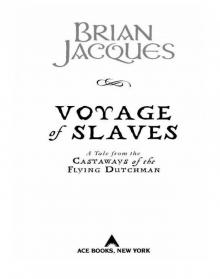 Voyage of Slaves
Voyage of Slaves Rakkety Tam
Rakkety Tam Pearls of Lutra
Pearls of Lutra Redwall
Redwall The Angel's Command
The Angel's Command Mossflower (Redwall)
Mossflower (Redwall) Marlfox (Redwall)
Marlfox (Redwall) Doomwyte
Doomwyte Martin The Warrior (Redwall)
Martin The Warrior (Redwall)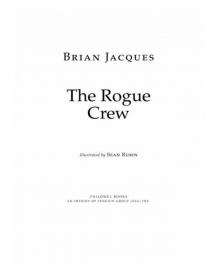 The Rogue Crew
The Rogue Crew Eulalia!
Eulalia! The Ribbajack: And Other Haunting Tales
The Ribbajack: And Other Haunting Tales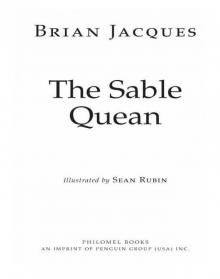 The Sable Quean
The Sable Quean The Bellmaker
The Bellmaker Lord Brocktree
Lord Brocktree The Legend of Luke
The Legend of Luke Loamhedge
Loamhedge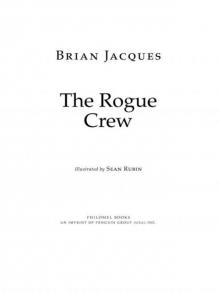 The Rogue Crew: A Tale of Redwall
The Rogue Crew: A Tale of Redwall![[Redwall 18] - High Rhulain Read online](http://i1.bookreadfree.com/i/03/23/redwall_18_-_high_rhulain_preview.jpg) [Redwall 18] - High Rhulain
[Redwall 18] - High Rhulain The Pearls of Lutra
The Pearls of Lutra Salamandastron (Redwall)
Salamandastron (Redwall) Loamhedge: A Novel of Redwall
Loamhedge: A Novel of Redwall Outcast Of Redwall
Outcast Of Redwall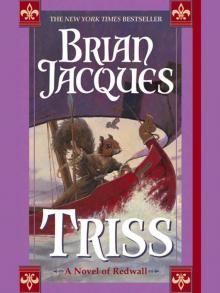 Triss: A Novel of Redwall
Triss: A Novel of Redwall The Taggerung (Redwall)
The Taggerung (Redwall) The Angel's Command fd-2
The Angel's Command fd-2 Doomwyte (Redwall)
Doomwyte (Redwall)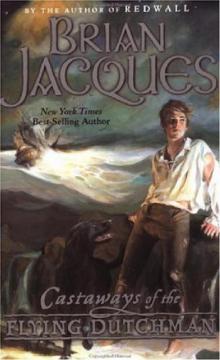 Castaways of the Flying Dutchman fd-1
Castaways of the Flying Dutchman fd-1![[Flying Dutchman 01] - Castaways of the Flying Dutchman Read online](http://i1.bookreadfree.com/i1/04/07/flying_dutchman_01_-_castaways_of_the_flying_dutchman_preview.jpg) [Flying Dutchman 01] - Castaways of the Flying Dutchman
[Flying Dutchman 01] - Castaways of the Flying Dutchman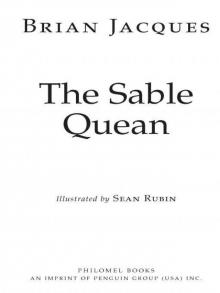 The Sable Quean (Redwall)
The Sable Quean (Redwall) The Bellmaker (Redwall)
The Bellmaker (Redwall) Mariel Of Redwall
Mariel Of Redwall Mattimeo (Redwall)
Mattimeo (Redwall) High Rhulain (Redwall)
High Rhulain (Redwall)